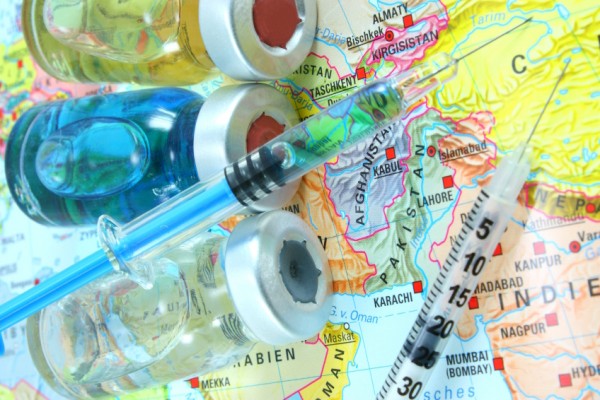For our Mongol Rally trip we will drive through 20 different countries, visiting very remote places like Pamir Highway which bordered Afghanistan. Nobody want to get sick while traveling, especially for this trip of the lifetime.
Below is a list of vaccinations recommended by Centers for Disease and Control Preventions (yes we type in each countries one by one and aggregate the results below), hope this information is helpful for any future travelers ;-) We added the Tick Borne vaccines too because we are going to camp out a lot, but unfortunately it is not available in the U.S.
According to CDC, the countries that listed the most vaccinations needed are Turkey, second is Tajikistan. Only Turkey requires Polio, only Russia requires Japanese Encephalitis, and Turkey, Azerbaijan and Tajikistan all requires Malaria.
Depends on where you are from you might already have the “routine vaccines” from your childhood immunization shots including MMR, DTap-ITV, HBV…etc. (Kenneth is from Hong Kong he found this chart that compared U.S. and U.K. child immunization) e.g. If you already had 3 HBV shots you are already have lifetime immunization against Hepatitis B.
Here’s our route for your reference. Young and Kenneth decided to only take the following 3 shots: – Hepatitis A, Typhoid, Japanese Encephalitis.
*note: Tick-Borne Encephalitis (TBE) is not available in U.S.A. but available in Canada and other European countries. For Rabies we simply don’t have enough time to do it- 3 shot vaccine (days 0, 7, 21-28) and we decided too late.
The vaccinations are not cheap and they are not covered by the insurance. Here’s how much it costs for Kenneth, he got it done at a travel clinic in Mid-Town Manhattan:
– Hepatitis A: $80
– Typhoid: $80
– Japanese Encephalitis (2 shots): $220 X 2 = $440
– Doctor Visit: $65
All travelersYou should be up to date on routine vaccinations while traveling to any destination. Some vaccines may also be required for travel. Check the vaccines and medicines list and visit your doctor (ideally, 4-6 weeks) before your trip to get vaccines or medicines you may need. |
||
| Routine vaccines |
Make sure you are up-to-date on routine vaccines before every trip. These vaccines include measles-mumps-rubella (MMR) vaccine, diphtheria-tetanus-pertussis vaccine, varicella (chickenpox) vaccine, polio vaccine, and your yearly flu shot.Click for more info | |
Most travelersGet travel vaccines and medicines because there is a risk of these diseases in the country you are visiting. |
||
| Hepatitis A | CDC recommends this vaccine because you can get hepatitis A through contaminated food or water, regardless of where you are eating or staying.Click for more info | |
| Typhoid | You can get typhoid through contaminated food or water. CDC recommends this vaccine for most travelers, especially if you are staying with friends or relatives, visiting smaller cities or rural areas, or if you are an adventurous eater.Click for more info | |
Some travelersAsk your doctor what vaccines and medicines you need based on where you are going, how long you are staying, what you will be doing, and if you are traveling from a country other than the US. |
||
| Hepatitis B | You can get hepatitis B through sexual contact, contaminated needles, and blood products, so CDC recommends this vaccine if you might have sex with a new partner, get a tattoo or piercing, or have any medical procedures.Click for more info | |
| Rabies | Rabies can be found in dogs, bats, and other mammals, so CDC recommends this vaccine for the following groups:
|
|
| Malaria | When traveling, you should avoid mosquito bites to prevent malaria. You may need to take prescription medicine before, during, and after your trip to prevent malaria, depending on your travel plans, such as where you are going, when you are traveling, and if you are spending a lot of time outdoors or sleeping outside. Talk to your doctor about how you can prevent malaria while traveling.Click for more info | |
| Polio | (Turkey only) You may need a polio vaccine before your trip to Turkey, especially if you are working in a health care facility, refugee camp, or humanitarian aid setting. This kind of work might put you in contact with someone with polio.
If visiting Turkey with children, it is especially important to make sure they are up-to-date on their routine polio vaccinations. |
|
| Japanese Encephalitis | (Russia Only) Depending on what time of year you are traveling, you may need this vaccine if you are visiting certain remote areas of Russia for more than a month, or if you will be spending a lot of time outdoors in those areas during a shorter trip. Your doctor can help you decide if this vaccine is right for you based on your travel plans. See more in-depth information on Japanese encephalitis in Russia.Click for more info | |
| Tick-Borne Encephalitis (TBE) | TBE is found in many parts of Europe and Asia (from eastern France to northern Japan and from northern Russia to Albania). Several thousand cases are reported each year, but there are probably many other cases that do not get reported. The highest number of cases occurs in Russia. Other countries with high risk for disease are Czech Republic, Estonia, Germany, Hungary, Latvia, Lithuania, Poland, Slovenia, Sweden, Switzerland, China, Japan, Mongolia, and South Korea. Travelers are more likely to get TBE from April through November (mostly in early and late summer) and when traveling to forested areas where ticks are common.Click for more info | |





Comments are closed.